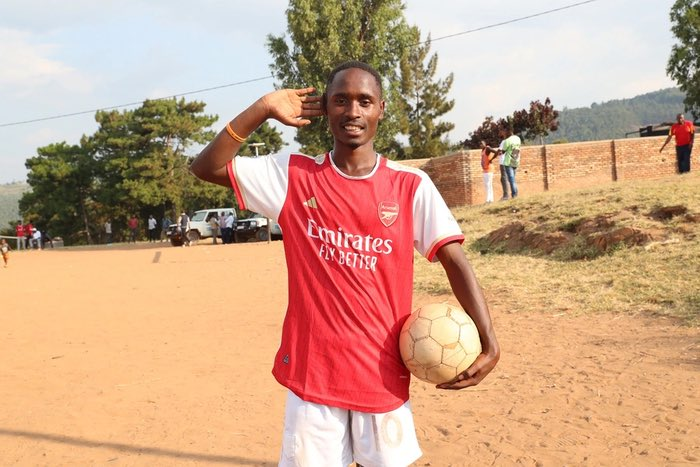
By Eric Didier Karinganire
Jean-Luc Rwamasirabo, a Congolese refugee footballer in Nyabiheke refugee camp. © UNHCR/Eric Didier Karinganire
Sport gives refugee youth a chance to rebuild their lives, form friendships, and find joy.
When Jean-Luc Rwamasirabo is playing football, he feels at ease and all his worries fade away.
“It makes me feel good because I’m doing something I truly love,” he explains.
The 19-year-old footballer finds refuge in the game to escape the distress that troubled his past.
At a very young age, conflict forced Jean-Luc and his family to flee from their home village in the eastern Democratic Republic of Congo. They found safety in Nyabiheke refugee camp, in Rwanda.
Growing up in the refugee camp, Jean-Luc has always loved playing football as a way to cope with his new life in the camp.
“Football is great; it’s the game I found myself excelling at, and I’ve loved it since I was 7 years old. I play as a winger, and I really enjoy dribbling.”
According to the young refugee footballer, playing football is also good as it improves blood circulation and provides opportunities to meet new people.
Bosco Mugiraneza, 23, is another Congolese refugee who plays football in Nyabiheke refugee camp and coaches younger refugees in football in the camp. Like Jean-Luc, he believes that the importance of sport for displaced youth is beyond a hobby.
“As children living in a refugee camp, we tend to stay in one place without much movement, unaware of the outside world,” he explains. “When we participate in sports, we get exposure to the external world and receive different types of training. We train children to be well-behaved, disciplined, and polite, just as we were trained.”
As part of the Sport for Protection Programme, refugee athletes like Bosco get some coaching sessions so that they can train fellow younger refugees.
Sport gives refugee youth a chance to rebuild their lives, form friendships, and find joy.
UNHCR, the UN Refugee Agency, works closely with partners to ensure that refugee-hosting areas have access to sports equipment, facilities, and training they need so that they can play, shine, grow, and thrive.
In June, UNHCR Rwanda collaborated with Mr. Bernhard Hirmer, Head of Coaching at the FC Bayern Academy in Rwanda, to provide training of trainers for refugee football players in Nyabiheke refugee camp, which is also a gap in other camps.
Despite the efforts invested into sporting in refugee settings across the country, some challenges persist.
Jean-Luc and Bosco say that access to sports equipment and proper playgrounds are some of the challenges they face.
“As refugee children, we also face some challenges in football: our progress is limited due to our refugee status, preventing us from reaching the level we aspire to,” Jean-Luc points out. “We need advocacy from our leaders to ensure we have the opportunity to play.” [Source: UNHCR]. (End)
